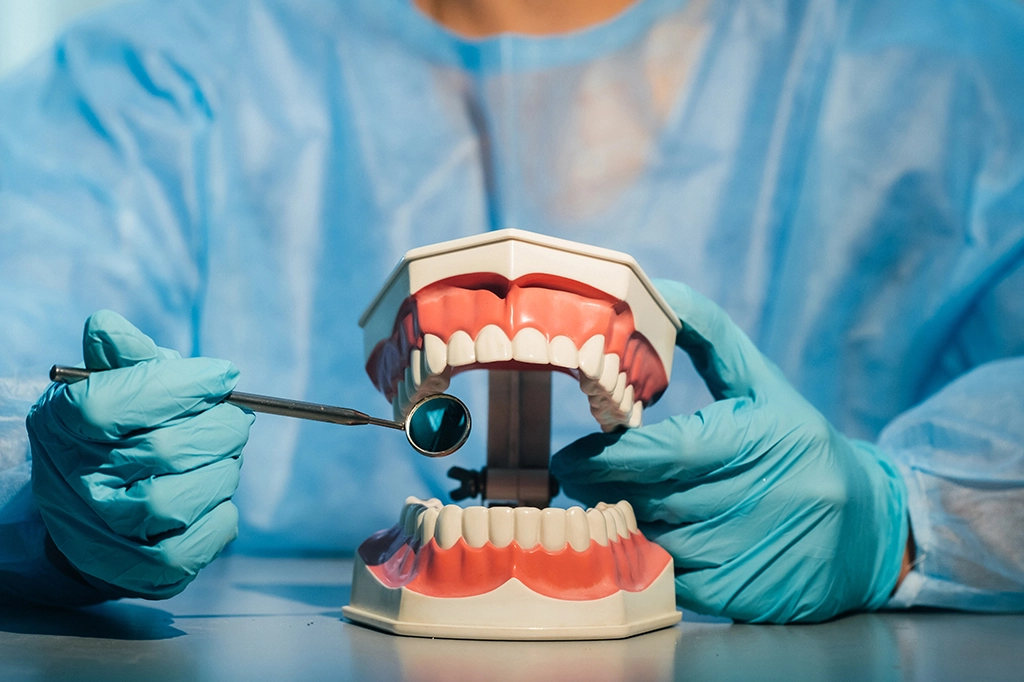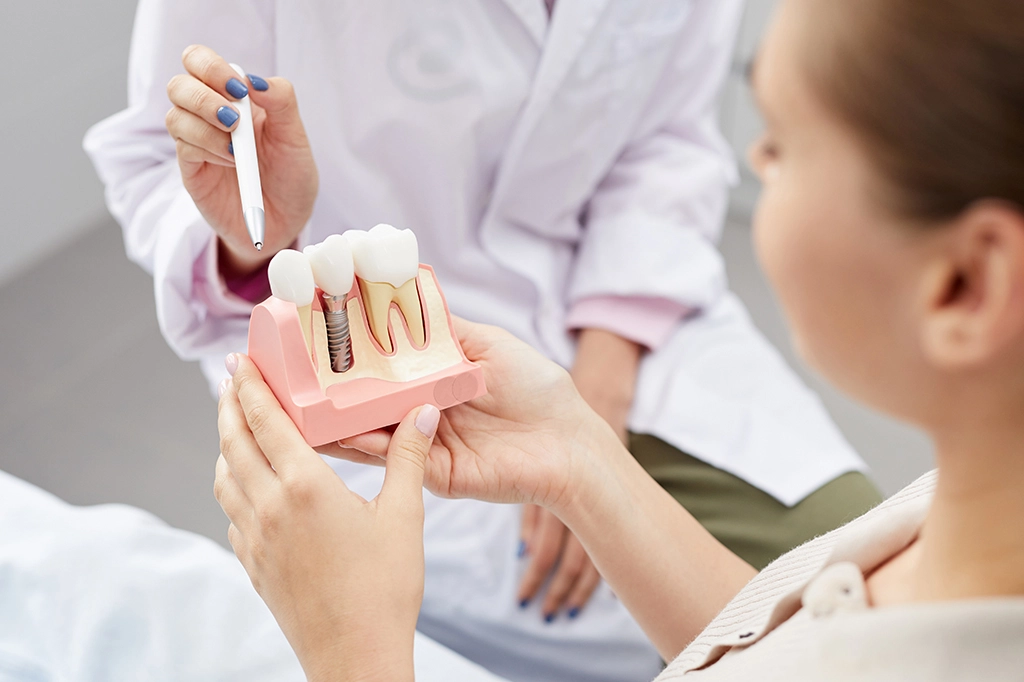If you are missing two or more consecutive teeth, but not enough to require a full denture, you may want to consider an implant-supported bridge. This tooth replacement solution is long-lasting, functional, and attractive.
Traditional fixed bridges and removable partials require support from your natural teeth, but an implant-supported bridge will not. This will preserve your chewing ability and restore your smile without affecting your natural teeth.
If you think you may be a candidate for an implant-supported bridge, contact one of our offices is Houston, Spring, or Katy, Texas. We are here to serve you and your dental needs.
An implant-supported bridge is also referred to as a “fixed dental partial” or a “fixed partial denture”. It is a permanent tooth replacement solution for patients who are missing several teeth in a row or whose natural teeth are not enough to support a traditional bridge.
With this tooth replacement solution, the dentist will insert two or more dental implants into your jawbone- on each side of the gap- and a custom bridge looking exactly like your natural teeth with respect to color and shape will be anchored to the implants.


By replacing your missing teeth with a bridge, you preserve your tooth spacing and keep the neighboring teeth from shifting into the open space. For a long time, traditional bridges have been the standard for replacing missing teeth, but for some patients , implant-supported bridges are a better option.
A traditional bridge is anchored to a natural tooth on each side of the gap. This means that we need to file down the enamel on those supporting teeth to prepare them for the bridges to be placed over them. This also means that your natural teeth must be healthy enough to support a bridge. If the neighboring teeth are decayed or loose- or if you have bone loss or gum disease, must be addressed first or the bridge could ultimately fail. Also in severe bone loss with the adjacent supporting teeth a tooth supported bridge may not be an option.

On the other hand, an implant-supported bridge doesn’t require support from your natural teeth. Instead, we install an implant on each side of the gap. The implant acts as an artificial tooth root. This is often the best option for patients whose teeth are not healthy enough to support a partial denture or traditional bridge. The implant stimulates jawbone growth, which means you reduce your risk of implant and bridge failure.

With a traditional bridge, you can replace 1 or 2 teeth between two crowns- so a total of 4 teeth will be on the bridge. This will result in an aesthetically-pleasing, durable restoration.
When patients are missing multiple teeth or the teeth on either side of the gap are healthy without any cavity, we recommend implant bridges. We can replace multiple missing teeth with artificial teeth on an implant-supported bridge, since implants can support more weight than natural teeth. In fact, for patients who are missing all of their teeth, a full arch fixed denture can be supported with 4 to 6 implants, based on your jawbone anatomy.
Over time, due to decay, bacteria, periodontal disease and fracture of the porcelain around the anchoring teeth, traditional bridges tend to wear out. Also, bone loss can cause them to shift around. Typically, traditional bridges need to be replaced every 5 to 10 years- which means that over your lifetime, you may end up replacing them 2 to 3 times or more.
When you have your bridge refitted over the supporting teeth, they get worn down and, at some point, you may not have enough healthy teeth to support it. Therefore, there are some risks associated with traditional bridges and they are much more expensive over your lifetime compared to single implants or implant-supported options.

On the other hand, an implant-supported bridge lasts much longer. In fact, with proper care and maintenance, it can last the rest of your life. Even if the bridge does wear out, the implants typically do not need to be replaced. Implants are considered the longest-lasting tooth replacement solution. After they are placed into your jawbone, the bone fuses around them, permanently securing them and improving the bone quality around them provided good oral hygiene is maintained and regular cleaning appointments are made with the hygenist.
At A Dental Care/ Lifetime Dental and Implant center, we believe that it’s obvious that implant-supported bridges are an excellent option, especially for patients that are unable to get a traditional bridge. Here are a few of the advantages of implant-supported bridges:

An implant-supported bridge typically requires two different surgeries with a wait time in between to allow the jaw to heal properly.
First, the implants will be placed. They will be surgically placed into your jawbone. An implant acts as a tooth root and creates a solid foundation for your bridge. If your bone structure and density isn’t sufficient, you may need a bone graft surgery, which will increase the time required for the treatment.
Once the implants are placed, you’ll need to wait for 4 to 6 months to allow the implants to fuse with your jawbone. We may provide you with temporary teeth and we’ll need to see you several times during the healing process to ensure that it’s healing as expected.
Finally, the lab creates a custom dental bridge to match the size, shade, and shape of your remaining natural teeth. This bridge will be attached to the implants, and you’ll be able to show off your new smile the same day.
For patients missing two or more teeth in a row, an implant-supported bridge may be a good option. It is a natural-looking solution that offers a variety of benefits. However, in order to qualify for dental implants, you must have enough bone to support the implants and your overall oral health must be good.
We do have some patients that can improve their candidacy for the procedure by undergoing preparatory procedures, such as a sinus lift or bone graft. Also, if you have tooth decay or gum disease, we must resolve those issues before dental implants can be placed.
If you are a smoker, you must be willing to give up smoking prior to and immediately following implant surgery. Ideally, we would like for you to give it up for good. Research has shown that people who are smokers have 25% more chance of implant failures than those who do not smoke.
Finally, uncontrolled diabetes may prevent you from receiving dental implants- but we can help you create a strategy that will allow implants to be part of your dental treatment.
There are several factors involved in determining the cost of an implant-supported bridge, including the number of implants, the type of implants used, the materials used in the restoration, and whether or not you need additional procedures such as sinus lifting or bone grafting.
On average, a 3-unit implant costs between $10,000 to $13,000.
At A Dental Care/ Lifetime Dental and Implant Center, we understand that procedures like these can be expensive and you may need some help. That is why we accept a variety of insurance plans and most of them will pay at least a portion of the cost. We will work with your insurance company to determine your coverage.

In addition, we accept credit cards and offer several options for financing, including CareCredit, Sunbit, Alphaeon Credit, Proceed financing and Ally. We understand that putting off dental procedures can be detrimental to your overall health and want to get you back to feeling like yourself again as soon as possible.
Our patients often have questions about implant-supported bridges. Below are some of the most frequently asked questions:
An implant-supported bridge is a dental bridge that is supported by dental implants as a long-term solution for missing teeth. It is a permanent solution for patients who are missing several consecutive teeth and can last for 20+ years with proper care and maintenance. On the other hand, traditional bridges typically must be replaced every 5 to 10 years. For most patients, an implant-supported bridge will last the rest of their life.
For most dental implant procedures, we use a local anesthetic. However, for patients with high dental anxiety, We offer sedation. The local anesthetic will numb the area, making the procedure painless. There are no nerves in the jawbone where the implant is being placed, so you won’t have pain from that. You may feel some pain or discomfort for a few days after the procedure- just as you would after any other dental procedure- but it is typically minor, and an OTC pain reliever can help.
Dental implants are among the more expensive dental treatments- but an implant-supported bridge is a wonderful investment for patients that want a permanent replacement for their missing teeth. We accept a variety of flexible payment plans, such as CareCredit, Alphaeon, Sunbit, Proceed financing and Ally. This allows you to spread your payments out over a period of time instead of having to pay for it all at once. We also accept a variety of insurance plans, most of which cover at least a portion of the procedure, which will help with your out-of-pocket expense.
If you are missing multiple teeth and believe you may be a candidate for an implant-supported bridge, contact our office today to schedule your consultation. We have four locations in Houston, as well as one in Spring and one in Katy. Let us improve your confidence by restoring your smile. When you come to the office, we will start by taking a few x-rays and CBCT ( a 3- dimensional x ray) and our highly skillful doctors will do the exam . Then, we will create a treatment plan that addresses your needs and goals.
About Us
At A Dental Care, we understand the importance of having access to emergency dentistry services in Houston, TX. We provide comprehensive dental care in Houston, TX for individuals who need urgent attention and are committed to providing excellent customer service. Rated as one of the Best Dentists in Houston, TX.
2022 © A Dental Care. All Rights Reserved.
Dental Marketing by WEB MARKETING FOR DENTISTS